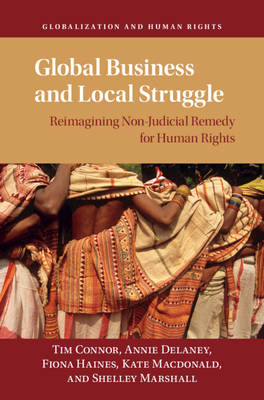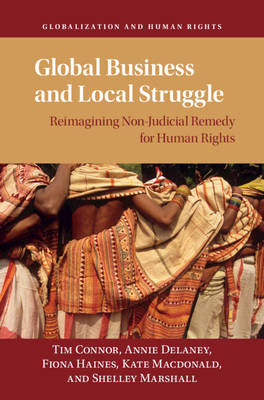
- Afhalen na 1 uur in een winkel met voorraad
- Gratis thuislevering in België vanaf € 30
- Ruim aanbod met 7 miljoen producten
- Afhalen na 1 uur in een winkel met voorraad
- Gratis thuislevering in België vanaf € 30
- Ruim aanbod met 7 miljoen producten
Zoeken
Global Business and Local Struggle
Reimagining Non-Judicial Remedy for Human Rights
Tim Connor, Annie Delaney, Fiona Haines
€ 187,45
+ 374 punten
Omschrijving
In the quest for human rights justice for communities and workers whose rights are breached by transnational businesses, non-judicial mechanisms (NJMs) are often deployed, but how effective are they? This book creates a blueprint for reforming transnational human rights NJMs and for helping communities and workers to use them. Through 587 interviews with 1100 individuals over five years of research in Indonesia and India, the authors delve into the practical workings of NJMs in diverse industries and contexts. The findings reveal that while NJMs are limited in providing standalone remedies, they can play a valuable role within a broader regulatory ecosystem. Combining rich empirical data, multi-method analyses and a new theoretical framework, the authors argue for a multi-pronged approach to human rights redress. Their findings will advance both academic and policy debates about the merits and shortcomings of NJMs.
Specificaties
Betrokkenen
- Auteur(s):
- Uitgeverij:
Inhoud
- Aantal bladzijden:
- 288
- Taal:
- Engels
- Reeks:
Eigenschappen
- Productcode (EAN):
- 9781009529396
- Verschijningsdatum:
- 7/08/2025
- Uitvoering:
- Hardcover
- Formaat:
- Genaaid
- Afmetingen:
- 152 mm x 229 mm
- Gewicht:
- 562 g

Alleen bij Standaard Boekhandel
+ 374 punten op je klantenkaart van Standaard Boekhandel
Beoordelingen
We publiceren alleen reviews die voldoen aan de voorwaarden voor reviews. Bekijk onze voorwaarden voor reviews.







